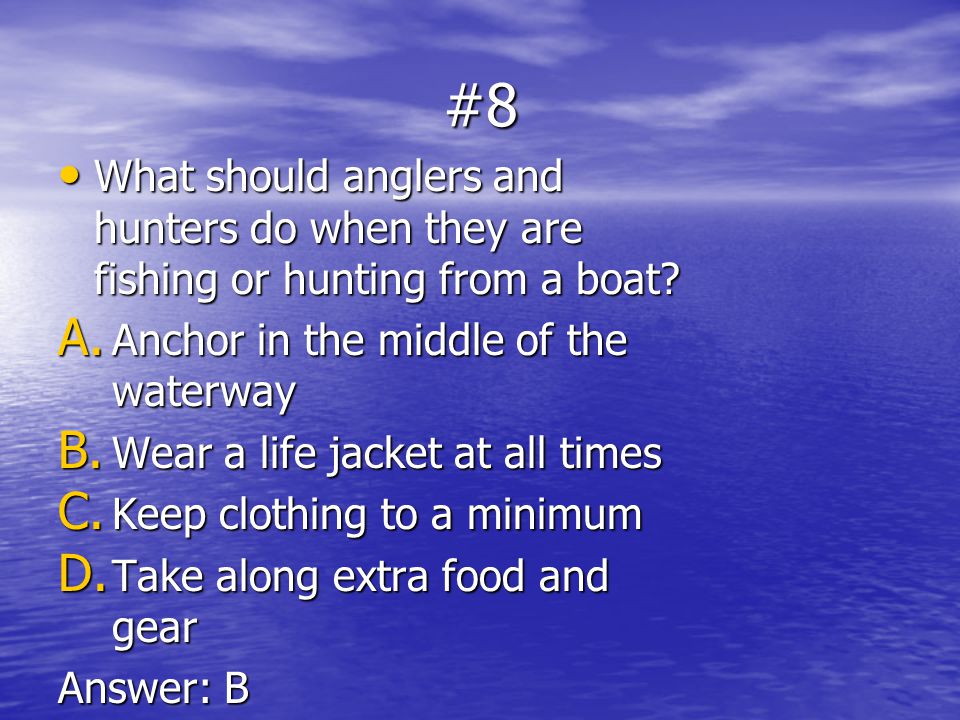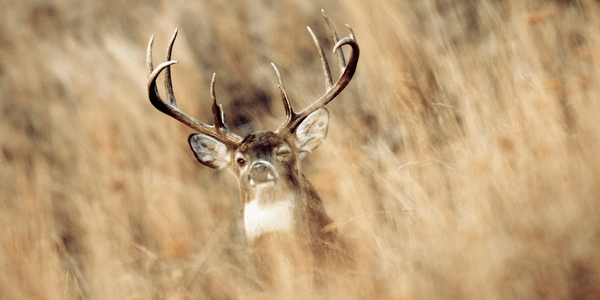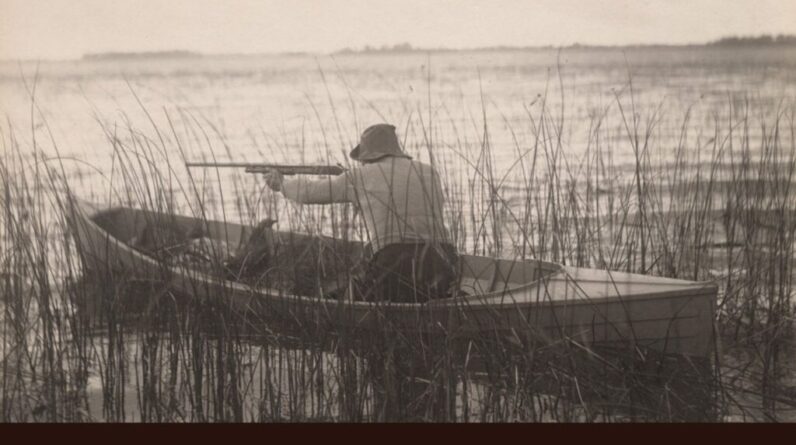
Have you ever wondered what you should do when you’re out fishing or hunting from a boat? It’s a common question among anglers and hunters alike. Whether you’re a seasoned veteran or just starting out, it’s important to know the best practices to ensure a safe and successful outing. In this article, we’ll dive into the topic and provide you with some valuable tips and advice that will help you make the most of your time on the water.
When it comes to fishing or hunting from a boat, there are a few key things to keep in mind. First and foremost, always prioritize safety. Make sure everyone on board is wearing a life jacket and familiarize yourself with the proper operation of the boat. Additionally, be aware of your surroundings and follow all local boating regulations. It’s also important to respect the environment and practice ethical angling and hunting practices. In our upcoming article, we’ll go into more detail on each of these topics and provide you with even more helpful tips to enhance your experience. So stay tuned and get ready to level up your boating adventures!
CLICK HERE FOR THE BESTSELLING HUNTING GEAR
Safety measures for anglers and hunters on boats
Fishing and hunting are popular recreational activities that often take place on boats. While the thrill of the sport and the beauty of the water can be exhilarating, it is important to prioritize safety when participating in these activities. Whether you are an experienced angler or hunter or just starting out, there are several safety measures that you should always keep in mind when out on the water.
Wearing a life jacket at all times
The most crucial safety measure that every angler and hunter should follow is wearing a life jacket at all times while on a boat. Accidents can happen unexpectedly, and wearing a properly fitted life jacket can greatly increase your chances of survival in the event of an emergency. Make sure to choose a life jacket that is approved by appropriate safety authorities and that fits you well to ensure maximum protection.
Carrying safety equipment such as a whistle and a flashlight
In addition to wearing a life jacket, it is important to carry safety equipment on board. A whistle and a flashlight are two essential items that can help alert others to your presence in case of an emergency. A whistle can be used to attract attention if you find yourself in distress, while a flashlight can come in handy during low-light conditions or in the event of a power outage. Keep these items easily accessible and in good working condition to ensure your safety.
Checking weather conditions before going out on the water
Before heading out on your fishing or hunting trip, it is essential to check the weather conditions. Weather can change rapidly, and being caught in inclement weather can put your safety at risk. Stay updated on weather forecasts and pay attention to any warning signs of approaching storms or rough waters. It is always better to postpone your trip or seek shelter if adverse weather conditions are expected.
Rules and regulations to follow
Anglers and hunters must adhere to specific rules and regulations to ensure the sustainability of fish and wildlife populations. It is important to familiarize yourself with these regulations and be diligent in following them.
Understanding and following fishing and hunting regulations
Each region and body of water has its own set of fishing and hunting regulations that must be followed. These regulations are put in place to protect fish and wildlife populations, prevent overfishing, and maintain the balance of ecosystems. Familiarize yourself with the local regulations and ensure that you follow them closely. This includes understanding catch limits, size restrictions, and fishing and hunting seasons, as well as any specific rules regarding the use of certain gear or techniques.
Obtaining the necessary permits and licenses
In order to legally participate in fishing and hunting activities, anglers and hunters must obtain the necessary permits and licenses. These permits and licenses ensure that individuals have met the required qualifications and understand the rules and guidelines set forth by regulatory agencies. Failure to obtain the appropriate permits and licenses can result in fines or other legal consequences. Be sure to research the specific requirements for the area or body of water you plan to fish or hunt in and obtain the necessary permits and licenses before engaging in these activities.
Respecting catch limits and size restrictions
Catch limits and size restrictions are put in place to ensure the sustainability of fish and wildlife populations. It is crucial to respect these limits and restrictions to prevent overfishing and preserve the health of ecosystems. Catch and release practices are encouraged for species that are not intended for consumption, as this allows them to reproduce and maintain their populations. Be aware of the specific regulations for the fish and wildlife in your area and abide by them to contribute to the conservation efforts.

CLICK HERE FOR THE BESTSELLING HUNTING GEAR
Boat preparation and maintenance
Ensuring that your boat is in proper working order is essential to your safety while fishing or hunting. Taking the time to prepare and maintain your boat before departing can greatly reduce the risk of accidents or breakdowns while on the water.
Checking the boat for any damages or faults before departing
Before heading out on your fishing or hunting trip, thoroughly inspect your boat for any damages or faults. Check the hull for any cracks or leaks, inspect the propeller for any damage or debris, and ensure that all safety equipment is in working order. Address any issues that you find before departing to ensure that your boat is in optimal condition.
Keeping the boat clean and organized to avoid trip hazards
A clean and organized boat is not only aesthetically pleasing but also contributes to your safety. Loose gear or equipment can pose tripping hazards, especially when navigating in rough waters. Keep your boat tidy and stowed properly to avoid accidents and ensure that you can move freely and safely on board.
Inspecting and maintaining the boat’s motor and electrical systems
The motor and electrical systems of your boat are crucial components that need regular inspection and maintenance. Check the motor for any signs of wear or damage, and make sure all electrical systems, including navigation lights and radio, are in proper working order. Regular maintenance and servicing of the motor and electrical systems will help prevent unexpected breakdowns and ensure a safe and enjoyable fishing or hunting experience.
Proper storage and disposal of equipment
Anglers and hunters must be considerate of the environment and responsibly manage their fishing and hunting gear.
Storing fishing and hunting gear in designated compartments
To maintain a safe and organized boat, it is important to store fishing and hunting gear in designated compartments. This prevents gear from becoming tangled or causing obstructions that may pose a risk of injury or accidents. Utilize storage compartments, tackle boxes, and rod holders to keep your gear securely in place while on the water.
Securing firearms and ammunition in lockable cases
For hunters who carry firearms and ammunition on board their boats, it is crucial to store them securely. Invest in lockable cases specifically designed for firearms to prevent accidents or unauthorized access. Ensure that firearms are unloaded and ammunition is stored separately to further enhance safety.
Disposing of fishing lines and hooks responsibly to prevent wildlife entanglement
Proper disposal of fishing lines and hooks is essential to prevent wildlife entanglement and protect aquatic ecosystems. Always dispose of fishing lines and hooks in designated trash containers or recycling bins. Avoid discarding them in the water or leaving them behind on the boat or shoreline. Additionally, be mindful of your surroundings and remove any debris or discarded fishing gear you come across to minimize the risk to wildlife.

Responsible handling of catch and kills
Ethical and responsible practices should be followed when handling catch and kills during fishing or hunting activities.
Humanely dispatching captured animals in accordance with ethical practices
For hunters, it is important to dispatch captured animals humanely and in accordance with ethical practices. Be knowledgeable about proper shooting techniques and understand the anatomy of the animals you are targeting. Aim for clean and quick kills to minimize suffering and ensure ethical harvesting.
Handling fish carefully and releasing them gently if not intended for consumption
Anglers should handle fish with care to minimize stress and injury. Wet your hands before handling fish to prevent damage to their sensitive skin and scales. If you do not intend to consume the fish, release them gently and properly to ensure their survival. Follow catch and release guidelines to maximize the chances of fish surviving after being released.
Properly storing and preserving harvested animals to maintain freshness
For hunters, proper storage and preservation of harvested animals are essential to maintain freshness and prevent spoilage. After harvesting an animal, field dress it promptly and cool it down to the appropriate temperature. Utilize coolers or refrigeration to store the carcass until it can be processed further. Do not waste any part of the animal and make use of all edible portions to respect the animal’s life.
Awareness of surroundings and communication
Being aware of your surroundings and effectively communicating with others are crucial aspects of ensuring safety while on a boat.
Remaining vigilant of other boats, swimmers, and potential hazards
Always be aware of other boats, swimmers, and potential hazards in your surroundings. Keep a lookout for other vessels, rocks, shoals, or submerged objects that may pose a risk. Maintain a safe distance from other boats and avoid operating at high speeds in crowded areas. Practicing situational awareness can help prevent accidents and ensure the safety of everyone on the water.
Using appropriate hand signals or radio communication when necessary
Effective communication is essential when on a boat, especially in situations that require immediate attention or assistance. Learn and use appropriate hand signals to communicate with others on board and in the water. Additionally, carry a marine VHF radio or a cell phone with waterproof protection to communicate with emergency services or nearby boats in case of an emergency.
Keeping a safe distance from wildlife to avoid disrupting their natural behavior
When encountering wildlife while on a boat, it is important to maintain a safe distance and avoid disturbing their natural behavior. Keep in mind that wildlife may be sensitive to disturbances caused by boats or human presence. Observe wildlife from afar and avoid getting too close, as this can cause unnecessary stress and disrupt their natural activities.

Proper disposal of waste
Proper waste disposal is essential to minimize pollution and protect the environment. Follow these guidelines to ensure responsible waste management while on the water.
Following all regulations regarding waste disposal on the water
Familiarize yourself with the regulations regarding waste disposal on the water and follow them diligently. These regulations may vary depending on the region or body of water you are in. Dispose of waste in designated trash containers or recycling bins, and never throw garbage overboard.
Packing out all trash and refuse to leave the environment clean
To leave the environment clean and preserve the beauty of the water, pack out all trash and refuse. Bring garbage bags or containers on board to collect any waste generated during your fishing or hunting trip. Dispose of the trash properly when you return to shore, ensuring that it is placed in appropriate trash receptacles.
Avoiding any pollution by not throwing garbage overboard
One of the most significant contributions to water pollution is the improper disposal of garbage. Always avoid throwing any garbage overboard. Plastic waste, particularly, poses a severe threat to marine life and ecosystems. Remember to bring reusable containers or bags to minimize waste generation and dispose of any trash responsibly.
Knowledge of emergency protocols
Being prepared for emergencies and having the necessary knowledge and resources to respond appropriately can be lifesaving while on a boat.
Knowing how to respond in case of a boat malfunction or engine failure
Boat malfunctions or engine failures can occur unexpectedly, and knowing how to respond in such situations is vital. Familiarize yourself with basic troubleshooting techniques and understand the workings of your boat’s engine and other systems. Carry appropriate tools and spare parts that may be needed for minor repairs. In the event of a major malfunction or engine failure, ensure that you have the necessary communication devices to call for assistance and follow established emergency protocols.
Understanding basic first aid techniques and having a first aid kit onboard
Accidents and injuries can happen while fishing or hunting from a boat, making it crucial to have basic first aid knowledge and a well-stocked first aid kit. Educate yourself on basic first aid techniques and be prepared to respond to common injuries or medical emergencies. Carry a first aid kit that includes bandages, antiseptics, pain relievers, and any necessary medications.
Knowing the procedures for calling for assistance or emergency response
In the event of a life-threatening situation or emergency, knowing the procedures for calling for assistance or emergency response is crucial. Familiarize yourself with the marine distress signals and know how to properly use emergency communication devices such as marine VHF radios or satellite phones. Be aware of your location and provide accurate information when contacting emergency services for help.

Consideration for other boaters and wildlife
Respecting other boaters and wildlife is essential for maintaining a harmonious environment and ensuring the safety and enjoyment of all.
Obeying speed limits and navigation rules to ensure safety of others
Boating speed limits and navigation rules exist to ensure the safety of all individuals on the water. Adhere to these rules and operate your boat responsibly at a safe speed. Be mindful of your wake and avoid creating excessive noise or disturbances. By following these guidelines, you can help create a safe and enjoyable environment for everyone sharing the water.
Minimizing noise pollution and disturbance to wildlife habitats
Noise pollution can have a detrimental impact on wildlife habitats and disrupt natural ecosystems. Minimize noise pollution by keeping engine noise, music, and conversation to a reasonable level. Avoid entering sensitive areas, such as nesting or feeding grounds, and respect wildlife habitats by maintaining a safe distance. By minimizing disturbances, you can coexist peacefully with the natural environment.
Sharing fishing and hunting spots without crowding or interfering with others
Fishing and hunting spots are often shared among enthusiasts, and it is important to respect the space and rights of others. Avoid crowding or interfering with fellow anglers or hunters, and observe proper etiquette when sharing a fishing or hunting spot. Maintain a reasonable distance from others to ensure everyone can enjoy their experience without feeling crowded or pressured.
Conclusion
By following these guidelines, anglers and hunters can enjoy their boating experience safely and responsibly. Prioritizing safety measures such as wearing a life jacket, carrying necessary safety equipment, and checking weather conditions before heading out on the water is essential. Adhering to rules and regulations, properly preparing and maintaining your boat, and responsibly managing equipment and waste are equally important. Respecting wildlife, being aware of your surroundings, and understanding emergency protocols will contribute to the preservation of wildlife and the overall enjoyment of the fishing and hunting activities. Remember, safety should always be your top priority. So, whether you are an experienced angler or hunter or just starting out, make sure to prioritize safety and responsible practices when fishing or hunting from a boat.






